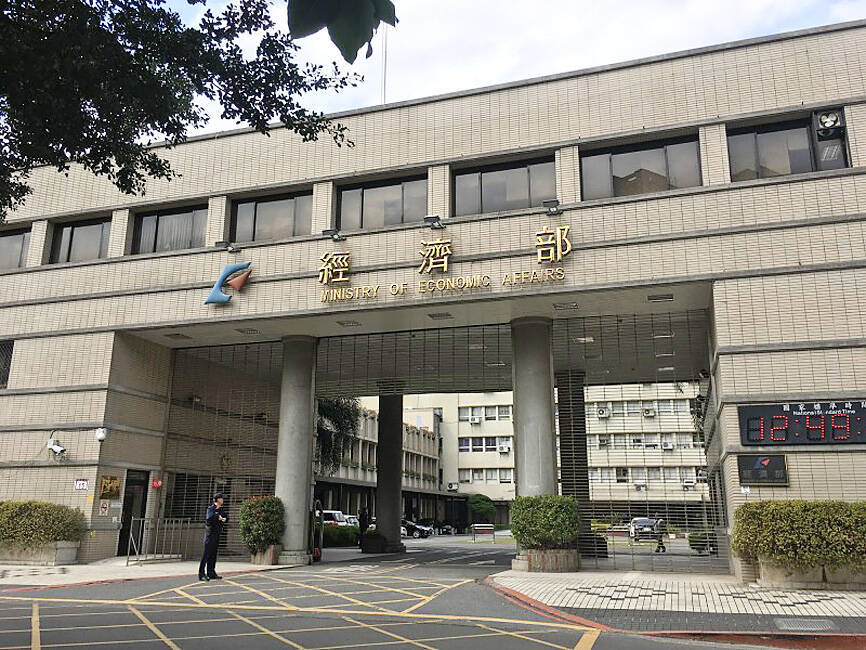With contract chipmaker Taiwan Semiconductor Manufacturing Co (TSMC, 台積電) investing huge amounts on building advanced fabs in the US and Japan, approved outbound investment from Taiwanese firms hit a new high last year, the Department of Investment Review under the Ministry of Economic Affairs (MOEA) said yesterday.
The department approved about US$44.93 billion in outbound investment last year, soaring 90.57 percent from a year earlier, smashing the previous record of US$23.58 billion in 2023.
The surge largely came after TSMC secured approval to raise its investment in the US and Japan by US$12.5 billion and US$52.62 billion, respectively, the department said in a report.

Photo: Taipei Times
In addition, semiconductor distributor WT Microelectronics Co (文曄科技) also obtained approval to spend US$3.98 billion acquiring Canadian-based Future Electronics Inc; Hon Hai Precision Industry Co (鴻海精密) was approved to invest US$2.63 billion in Foxconn Singapore Pte Ltd; and Vanguard International Semiconductor Corp (世界先進) received the green light to invest US$2.4 billion in Visionpower Semiconductor Manufacturing Co Ptd Ltd, the report said.
Last year, the department approved US$8.72 billion in investments in countries under the government’s New Southbound Policy, up 57.42 percent from a year earlier, with Singapore, Vietnam and Malaysia the main destinations.
The New Southbound Policy, introduced in 2016, aims to enhance trade and exchanges between Taiwan and 18 countries in Southeast Asia and South Asia, as well as Australia and New Zealand, in a bid to reduce Taiwan’s dependence on China.
As for China-bound investment, the approved amount totaled US$3.65 billion last year, up 20.33 percent from a year earlier, due to an increase in acquisitions and mergers by Taiwanese investors, the department said.
Meanwhile, Taiwan approved US$7.86 billion in direct foreign investments (FDIs) last year, down 30.18 percent from a year earlier due to a relatively high comparison base in 2023, despite a large amount of investment from multinational firms such as semiconductor equipment supplier ASML Holding NV, software giant Microsoft Corp and e-commerce giant Amazon.com Inc.
Taiwan's FDI hit a record US$13.3 billion in 2022 and the third-highest NT$11.25 billion in 2023 over the past 17 years, which the department attributed to the approval of a number of large offshore wind power and green energy investments during the two years. The second-highest was in 2018 at US$11.44 billion, department data showed.
Approved inbound investment from China jumped 901.04 percent from a year earlier to US$297.22 million last year as China-owned Cloud Network Technology Singapore Pte Ltd (鴻運科) was given approval to raise investment in its branch in Taiwan by NT$9 billion (US$273 million), the report said.
Approved investments from New Southbound Policy decreased 80.8 percent annually to US$487.4 million, with Singapore, Malaysia and Australia the main sources of investment, it said.

Application-specific integrated circuit designer Faraday Technology Corp (智原) yesterday said that although revenue this quarter would decline 30 percent from last quarter, it retained its full-year forecast of revenue growth of 100 percent. The company attributed the quarterly drop to a slowdown in customers’ production of chips using Faraday’s advanced packaging technology. The company is still confident about its revenue growth this year, given its strong “design-win” — or the projects it won to help customers design their chips, Faraday president Steve Wang (王國雍) told an online earnings conference. “The design-win this year is better than we expected. We believe we will win

Intel Corp chief executive officer Lip-Bu Tan (陳立武) is expected to meet with Taiwanese suppliers next month in conjunction with the opening of the Computex Taipei trade show, supply chain sources said on Monday. The visit, the first for Tan to Taiwan since assuming his new post last month, would be aimed at enhancing Intel’s ties with suppliers in Taiwan as he attempts to help turn around the struggling US chipmaker, the sources said. Tan is to hold a banquet to celebrate Intel’s 40-year presence in Taiwan before Computex opens on May 20 and invite dozens of Taiwanese suppliers to exchange views

Chizuko Kimura has become the first female sushi chef in the world to win a Michelin star, fulfilling a promise she made to her dying husband to continue his legacy. The 54-year-old Japanese chef regained the Michelin star her late husband, Shunei Kimura, won three years ago for their Sushi Shunei restaurant in Paris. For Shunei Kimura, the star was a dream come true. However, the joy was short-lived. He died from cancer just three months later in June 2022. He was 65. The following year, the restaurant in the heart of Montmartre lost its star rating. Chizuko Kimura insisted that the new star is still down

While China’s leaders use their economic and political might to fight US President Donald Trump’s trade war “to the end,” its army of social media soldiers are embarking on a more humorous campaign online. Trump’s tariff blitz has seen Washington and Beijing impose eye-watering duties on imports from the other, fanning a standoff between the economic superpowers that has sparked global recession fears and sent markets into a tailspin. Trump says his policy is a response to years of being “ripped off” by other countries and aims to bring manufacturing to the US, forcing companies to employ US workers. However, China’s online warriors